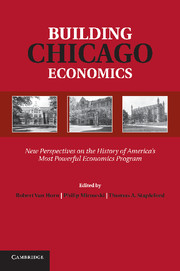 Building Chicago Economics
Building Chicago Economics Book contents
- Frontmatter
- Contents
- Figures and Tables
- Contributors
- Blueprints
- Orientation: In Search of the Chicago School
- Part One Economics Built for Policy: the Legacy of Milton Friedman
- One Positive Economics for Democratic Policy
- Two Markets, Politics, and Democracy at Chicago
- Part Two Constructing the Institutional Foundations of the Chicago School
- Part Three Imperial Chicago
- Part Four Debating “Chicago Neoliberalism”
- Index
- References
Two - Markets, Politics, and Democracy at Chicago
Taking Economics Seriously
from Part One - Economics Built for Policy: the Legacy of Milton Friedman
Published online by Cambridge University Press: 05 November 2011
- Frontmatter
- Contents
- Figures and Tables
- Contributors
- Blueprints
- Orientation: In Search of the Chicago School
- Part One Economics Built for Policy: the Legacy of Milton Friedman
- One Positive Economics for Democratic Policy
- Two Markets, Politics, and Democracy at Chicago
- Part Two Constructing the Institutional Foundations of the Chicago School
- Part Three Imperial Chicago
- Part Four Debating “Chicago Neoliberalism”
- Index
- References
Summary
In September and October 1975, New York Times columnist Anthony Lewis reported on the University of Chicago pedigree of the Pinochet government’s economic program. The so-called Chicago Boys, a group of Chilean alumni of the University of Chicago, had written a set of policy recommendations for Jorge Alessandri when he was a candidate in Chile’s 1970 presidential election. The election was won by Salvador Allende. In October 1973, a month after the military coup led by General Augusto Pinochet, the Chicago Boys published their policy recommendations as “El Ladrillo” (The Brick). Several members of the group were subsequently appointed to positions in the government. Anthony Lewis portrayed Friedman, who had visited Chile in the spring of 1975 with Arnold Harberger, as the “guiding light” of the Pinochet economic policy, a “policy that could not be imposed on a free society” (October 2, 1975). He attributed to Friedman the idea that a growing disparity of incomes between the rich and poor is part of the mechanism by which anti-inflation policy works. Lewis asked “if the pure Chicago economic theory can be carried out in Chile only at the price of repression should its authors feel some responsibility? There are troubling questions here about the social role of academics” (October 2, 1975).
Almost immediately, protests began on the University of Chicago campus under the auspices of the “Committee against Friedman/Harberger Collaboration with the Chilean Junta.” Protesters demanded that Friedman be driven out of the university. The protests and harassment lasted for the next five years, reaching a peak after the announcement that Friedman would receive the 1976 Nobel Prize. Friedman had fewer defenders among academics than one might expect given the collegiate totem of academic freedom. Some balanced their defense of Friedman’s rights against the gravity of the charges of giving policy advice to a repressive regime. Other academics joined the protesters. Nobel laureates George Wald and Linus Pauling wrote to the New York Times (October 24, 1976) accusing Friedman of being an accessory to human rights crimes. In a second letter published alongside theirs, two other Nobel laureates, David Baltimore and S. E. Luria, characterized the Nobel Prize committee’s selection of Friedman as “an insult to the people of Chile, burdened by the reactionary economic measures sponsored by Professor Friedman.”
- Type
- Chapter
- Information
- Building Chicago EconomicsNew Perspectives on the History of America's Most Powerful Economics Program, pp. 36 - 64Publisher: Cambridge University PressPrint publication year: 2011
References
- 4
- Cited by


